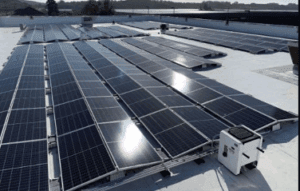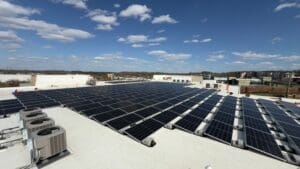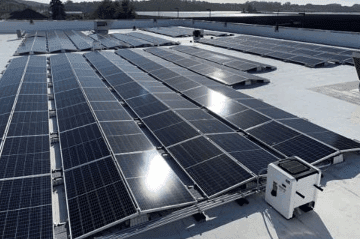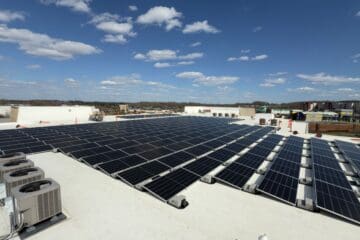Every solar sales consultant that you talk to will try to answer the question: “Why hire us over the competition?”
Listen to their answer.
I made a commitment to dedicate my career to the solar industry since the idea of engineered photosynthesis fits perfectly into my vision of a prosperous future for humanity. I would love to shout to the heavens that solar energy is all rainbows and butterflies, but I’ve discovered that at times, this industry has experienced some growing pains. As we’ve endured the bumps of this adolescent movement, solar energy might represent the new, unknown and a break from business-as-usual (an endeavor not everyone is comfortable with). I think a critical shopper might appreciate some truth telling as I hope to do my part in striving to be better. Maybe you will find some of my professional lessons learned to help you make your best decision of the decade.
From the beginning
Let’s start with some facts: Prices for solar today is only 10% of what they were 10 years ago. The manufacturing industry is churning out affordable products, but that doesn’t mean they’re proven. Right? There is typically a wake of incredulity when prospective customers are informed on the 25-30 year equipment warranties. The US solar industry only ramped up at around 2008 and these things are warrantied longer than a Toyota? The automotive industry has been around for over a hundred years – why are we different? If the pitch based on warranties sounds fishy, you might have forgotten that solar panels have been extremely useful for astronauts for decades.
We are different because Photo-Voltaic (PV) power had to be reliable for space-grade projects. If NASA deploys a satellite that costs millions and the power source fails after a decade, the project might not be worth it. Unlike the automotive industry, solar is actually rocket science! PV has arguably proven its reliability since the space age of the 1970’s and we repurposed the concept to make the world a cleaner place.
There are plenty of nay-sayers who see solar as something different from what they know, and license themselves to warn off friends and colleagues about perceived beleaguers of the freshmen in the room. “Don’t waste your money!” “There are too many installers who actually don’t know what they are doing!” “What if something goes wrong!” “Are they able to follow through?”

Photo credit: SpaceX/Pexels
The slick salesman with perfectly quaffed hair will not be on the roof during your installation. Solar projects consist of many tasks with many people working as a team. So how can a solar shopper discover the real, proven value in what they are purchasing? As a professional who has bounced around a bit in the industry since 2015, this is my guide to being a critical solar shopper:.
- Business referrals. Know someone who decided to put solar on their business or commercial property? Learn from their experience and see if they were happy with their contractor- or get advice on what to look for in a contractor if they have any or if theirs doesn’t service your area.
- The contractor should go through your proposal with you step by step. If they don’t, or if they can’t explain something, it’s a red flag. Also- review at the cost per Watt (before tax credits) on the proposal and make sure they’re competitive. Make sure you compare it to what you’re paying now, and look at the future utility projections.
- NABCEP or the “North American Board of Certified Energy Practitioners” regulate specific education courses for PV installation. The more people with these ACTIVE certifications working on your project, the better. Ask your sales-person if he or she is NABCEP certified. If not, ask to speak to someone who is. They are ultimately the ones making the important decisions for your project. Manufacturer specific certs are a bonus, if you’ve researched them before you’re pitched.
- Your contract should be specific. What is the make, model, and layout of the materials? Does it adhere to local codes and regulations, or does it adhere to the industry’s best practices? An experienced consultant should be well versed in how these materials are installed, but more importantly, they should know about how they are warrantied. Contractors buy materials that are their own brands. Pick the parts that you want!
- An inverter system (SolarEdge, Enphase, Solis, Fronious, SMA)
- Panels (LG, Q.Cells, JA, Jinko, Trina, Silfab, REC, Panasonic)
- Racking (Unirac, Snap N’ Rac, IronRidge, PanelClaw, ZEP,
- Battery (if needed – Tesla Powerwall, LG-Chem, Enphase Encharge, StorEdge)
Find a contractor that can work with a variety of brands. Don’t expect a good contractor to be able to install everything, but variety is what keeps them competitive. Each installer has their own vetting process to make sure these panels are up to their own standards. Also, keep in mind that the supply chain has been completely fubar since the pandemic.
I cannot emphasize specificity enough because contracts that aren’t specific are probably going to use the cheapest materials that they can find. It’s a recipe for disaster as they typically aren’t done well. They create a vicious cycle which goes something like this: Cheap materials makes difficult installations, which makes more frequent service visits, which means higher prices and more intense maintenance costs, which makes being cheap not so cheap. If you are going to go solar, research brands.
- Design Software matters. As someone who sketched out rooftops on graph-paper for 3 years and learned how to use 7 different CAD programs, trust me when I say that some design software is much more finely tuned than others. You might go shopping with a layout in mind and 5 contractors are going to give you very different numbers. The trick of using a CAD-based software is calculating how much sun your roof gets. These numbers directly relate to your solar harvest and thus your return on investment. This can be measured on-site, via satellite imagery LiDAR, or by a drone using pictography. The most cost-effective way to be accurate is with a drone. With pictographic software, a FAA part 107 certified pilot can fly a drone over your property, create a layout, have pricing figured out, and export a permit-ready design package ready to be reviewed and stamped by a professional engineer. This process is spot-on accurate since it reflects actual measurements taken on-site. Scanify’s shade mapping graphics are next level. They make every other design software feel like graphics from a Nintendo. I can see this becoming an industry standard.
Also read:

Could solar work for my commercial roof?
Could solar work for my commercial roof? One common for commercial property owners considering rooftop solar is whether their specific type of roof is suitable for solar installation. So, can solar be installed on any

Top Questions Businesses Ask About Commercial Solar Installation Companies
Top Questions Businesses Ask About Commercial Solar Installation Companies When businesses start exploring renewable energy, they often turn to commercial solar installation companies to help them make the switch. Understanding the process, costs, and benefits

Cutting Operating Expenses with Solar: A Smart Strategy for Commercial Real Estate Owners
Cutting Operating Expenses with Solar: A Smart Strategy for Commercial Real Estate Owners For commercial real estate (CRE) owners, operating expenses are one of the biggest factors affecting profitability. Rising utility costs, unpredictable energy pricing,
Every solar sales consultant that you talk to will try to answer the question: “Why hire us over the competition?” Listen to their answer. What kind of experience do they have on their team? How long have they been in business? Do they have a variety of customers in their portfolio and have a flexibility in their design capabilities? Some contractors will not take on what they consider more difficult projects but rather cookie-cut their arrays in a churn & burn way. The companies that have staying power are the ones that are and remain customer-centric. It’s the key to growth, viability and longevity.
I hope this blog post has enlightened all who read it as a set of honest recommendations from someone within the industry. Unlike most shoppers and sales consultants, I’ve seen exactly how the sausage is made. This teenaged industry is certainly growing and mistakes have been made along the way, but the contractors who have persevered these growing pains have a bright future ahead of us. Lessons learned are incredibly valuable so I invite any solar shopper to be critical of their contractor. I certainly have been selective of who I choose to represent!
Thanks for reading and Happy Shopping!



